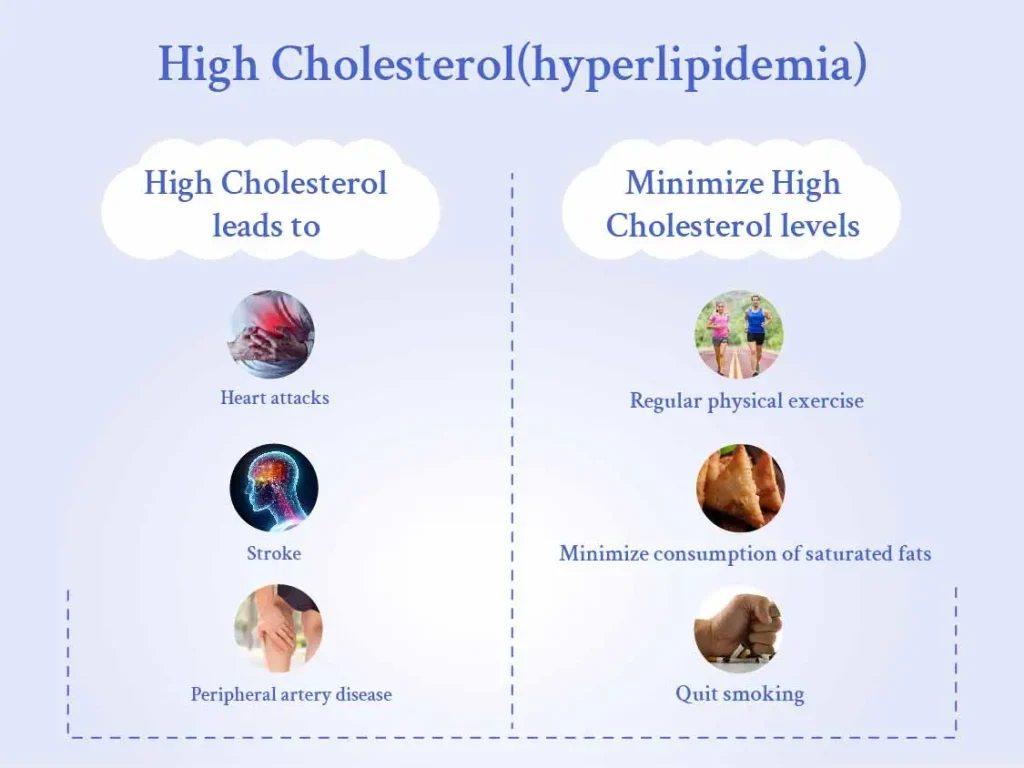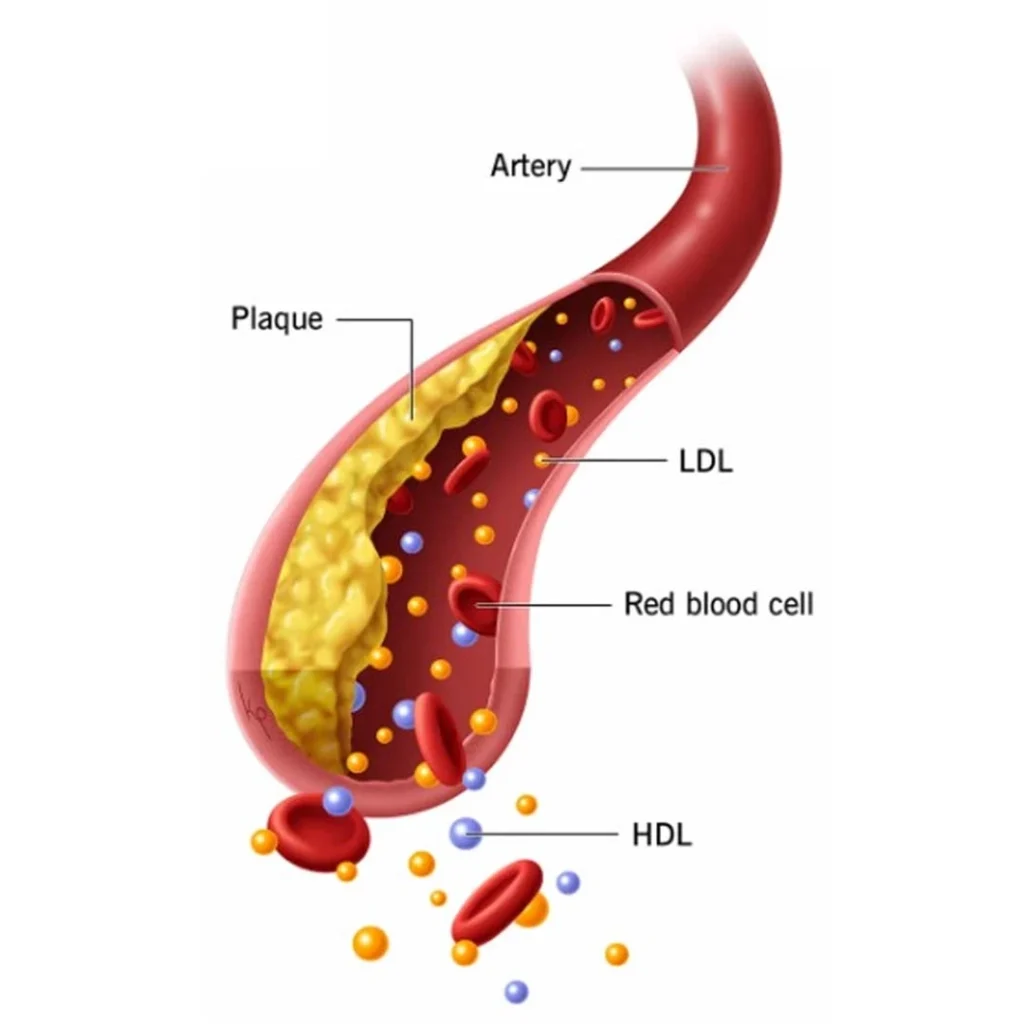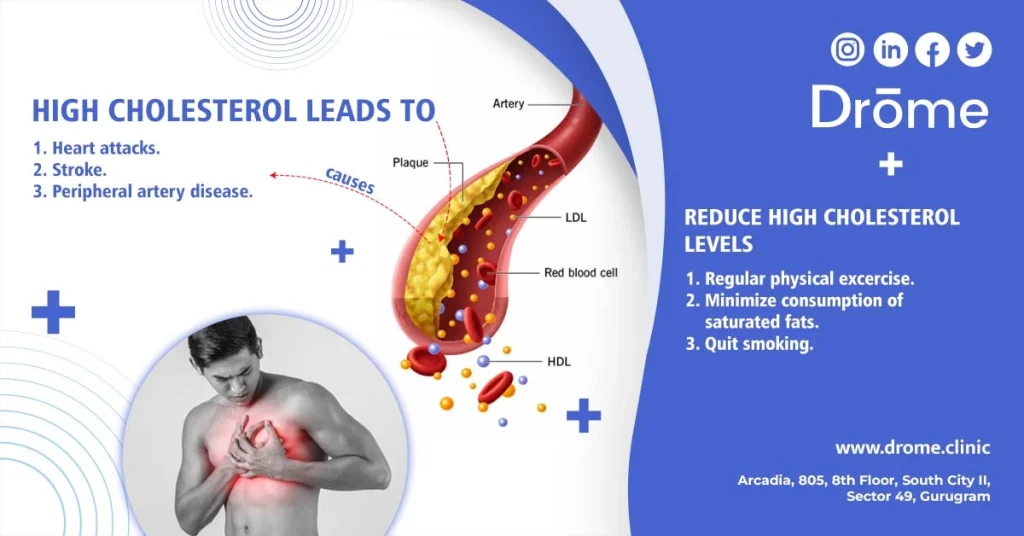Managing Hyperlipidemia: Your Guide to Understanding and Controlling High Cholesterol
Take control of your cholesterol. Healthy arteries, a healthier you.
Hyperlipidemia - High Cholesterol
Hyperlipidemia (high cholesterol) is increased levels of lipids or fats in blood. This can increase the risk of heart attack and stroke because these lipids deposit in the lumen and as a result blood can’t flow through the arteries easily.

What is cholesterol?
- Blood cholesterol is a waxy, fat-like substance made by the liver. Blood cholesterol is essential for good health. Our body needs it to perform important jobs, such as making hormones and digesting fatty foods.
- Dietary cholesterol is found in animal foods, including meat, seafood, poultry, eggs, and dairy products.
Types of Cholesterol
Low-Density Lipoprotein (LDL): Often referred to as ‘bad’ cholesterol, higher levels of LDL can lead to a buildup of cholesterol in your arteries
Very low Density Lipoprotein(VLDL): “Bad” form of cholesterol because, in excess, it causes plaque buildup (atherosclerosis) in the arteries.
High-Density Lipoprotein (HDL): Known as ‘good’ cholesterol, it helps remove other forms of cholesterol from your bloodstream.
Normal values of Cholesterol :
Total Cholestrol | <200 mg/dl |
LDL | <100mg/dl |
HDL | >40 mg/dl |
Triglycerides | <150mg/dl |
Risks Associated with High Cholesterol
- High cholesterol levels can silently damage your arteries.
- Particularly high levels of LDL cholesterol cause plaques to build up, narrowing the arteries and increasing the risk of blockages
Plaque
It is made up of deposits of cholesterol and other substances in the artery. Plaque buildup causes the inside of the arteries to narrow over time, which can partially or totally block the blood flow. This process is called atherosclerosis.
This leads to –
- Coronary artery disease.
- Heart attack.
- Stroke.
- Carotid artery disease.
- Sudden cardiac arrest.
- Peripheral artery disease.
- Microvascular disease.

Risk factors for Hyperlipidemia:
- Family history of high cholesterol.
- hypothyroidism.
- obesity.
- Drinking too much alcohol.
- Diabetes.
- Smoking.
Causes of Hyperlipidemia:
Various hyperlipidemia causes include:
- Drinking a lot of alcohol.
- Eating foods that have a lot of saturated fats or trans fats.
- Sitting too much instead of being active.
- Being stressed.
- Inheriting genes that make your cholesterol levels unhealthy.
- Being overweight.
Diagnosing high Cholestrol:
A blood test called LIPID PROFILE is used to diagnose cholesterol levels in blood.
Management and Treatment
Managing high cholesterol often involves lifestyle changes and, if necessary, medication:
Lifestyle Changes: Includes adopting –
- A healthy diet,
- Regular exercise,
- Quitting smoking,
- Maintaining a healthy weight.
- Limiting alcohol intake
Medication:
If elevated cholesterol levels are not controlled by lifestyle changes,Consult with your doctor for starting medication to lower cholesterol levels
Conclusion
Cholesterol management is a vital component of maintaining a healthy lifestyle. By understanding the types of cholesterol, their effects on the body, and taking steps to manage your levels, you can significantly reduce your risk of heart disease and stroke. Remember, it’s never too late to start making healthier choices that can lead to a longer, happier life.
Visit Drome Family Physicians for treatment
Sourced from CLEVELAND Clinic and CDC.*
Frequently Asked Questions About Cholesterol
Cholesterol is a waxy, fat-like substance made by the liver.It is needed to make vitamin D, hormones and substances that help digest foods.
‘Good’ cholesterol refers to high-density lipoproteins (HDL) that help remove other forms of cholesterol from your bloodstream. ‘Bad’ cholesterol denotes low-density lipoproteins (LDL), which can lead to plaque buildup in your arteries and increase heart disease risk.
Ideal total cholesterol levels are below 200 mg/dL. LDL should be less than 100 mg/dL, and HDL should be 60 mg/dL or higher to help lower your risk of heart disease.
Eating a healthy diet low in saturated and trans fats, exercising regularly, avoiding tobacco smoke and maintaining a healthy weight can help manage cholesterol levels.
Some people can manage their cholesterol through lifestyle changes alone, but others may need medication, especially if they have other risk factors for heart disease.
Yes, Familial Hypercholesterolemia is a genetic condition that causes naturally high levels of LDL cholesterol, often leading to early heart disease.




